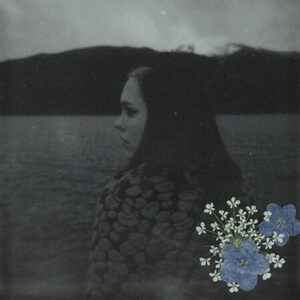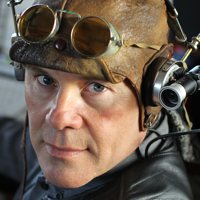
The Invisible Lighthouse Interview
Thomas Dolby
Steve Stav
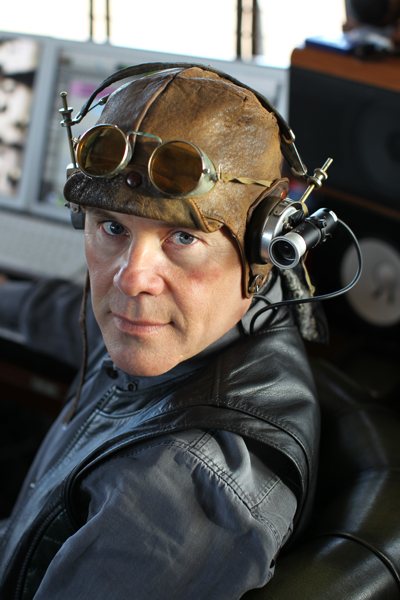
MTV icon Thomas Dolby has added another job description to his astounding résumé, that of “filmmaker.” His short film, The Invisible Lighthouse, debuted last spring to critical acclaim and awards at independent film festivals. Always one to up the ante, Dolby then positioned The Invisible Lighthouse as the centerpiece of a touring “transmedia event” that has garnered more rave reviews.
With the accompaniment of veteran musician, music supervisor/producer, and TV/film sound designer Blake Leyh (The Wire, Treme) Dolby marries the film with live narration and dramatics, sound effects, programmed visual effects, and, of course, music. It all sounds extraordinarily ambitious, until one remembers that the gracefully aging whiz kid who helped popularize synthesizers amongst mom ‘n’ pop America thirty years ago is at the helm.
Part adventure documentary, part biography, part fantasy, The Invisible Lighthouse is ambitious – and quite fascinating – all by itself. UFOs, a doomed lighthouse, family history, and musings on Dolby’s life and ancestral home in Britain’s East Anglia somehow all meld into a film that’s not only decipherable, but thought-provoking and quite poignant.
Before the commencement of a 22-city Invisible Lighthouse tour of the U.S. – and shortly after his 55th birthday – Ink19 spoke to one of popular music’s most remarkable figures about lighthouses, perspective, and family.
• •
In retrospect, you hinted at this film back when you were promoting the A Map of the Floating City album a couple of years ago.
The Invisible Lighthouse is like a “Making of A Map of the Floating City,” because I explore the area of Britain where I live, which was such a big influence on me when I was making that album… and while making many other albums. It’s an especially pertinent time, because the most emblematic feature of the coast where I live, which is very bleak and barren, is this lighthouse that I’ve known since I was a kid. To my horror, I found that they were going to close it down this year… which is what prompted me to make a film about it.
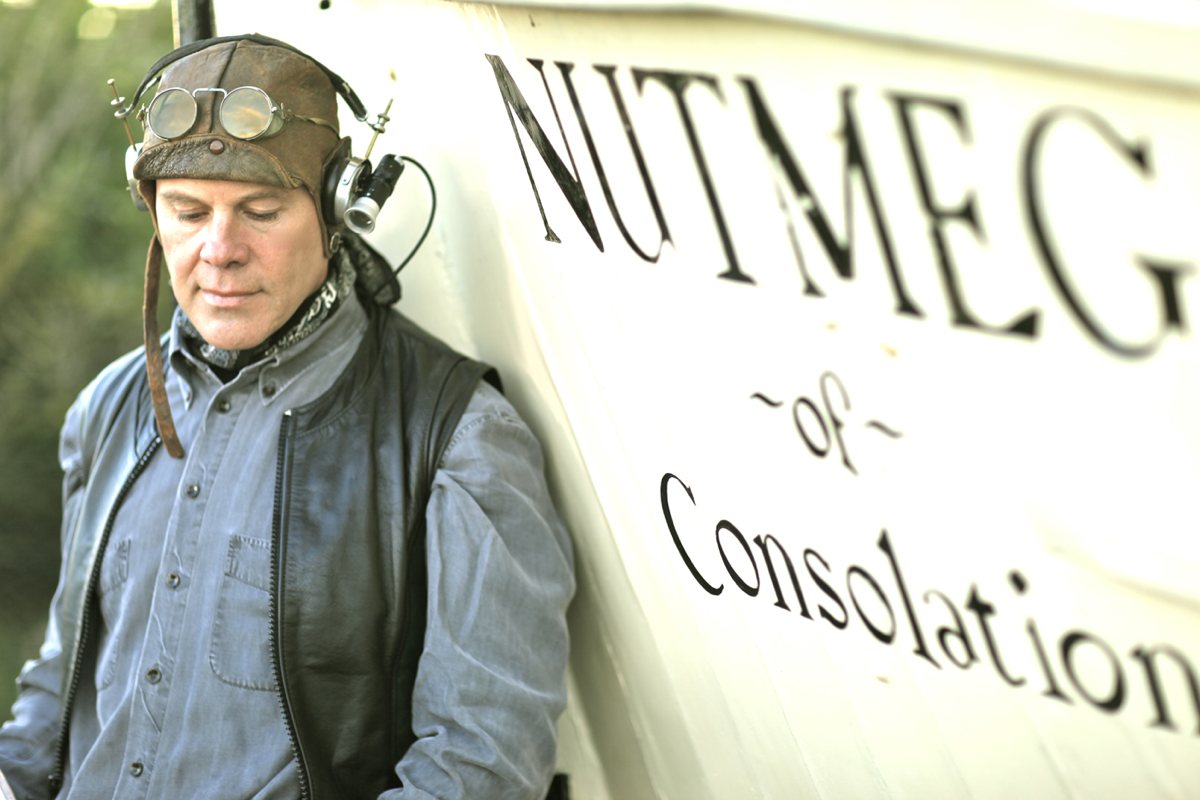
There’s an interesting subtext of reconciling childhood memories and perceptions with realities…
I think many of us tend to distort childhood memories to suit us. I’m sure I’m not the only person who has gone back to a geographical feature that they remember as a kid… something that they remember as a mountain is a little hill, or something they remember as a raging torrent of water that’s actually nothing more than a little creek.
I was beginning to think that the same was true for me… I can remember watching a building on fire, across the marshes, when I was ten years old. This was a historic building built by my great-great-grandfather, which was later turned into a concert hall by the British composer Benjamin Britten. In 1969, it burned to a cinder; I have a clear memory of watching the flames light up the sky from across the marshes. Years later, my mother told me that we were nowhere near the area that night; we were hundreds of miles away. But (the incident) created such a traumatic sort of impression on me that I when I told that story, it was as if I were re-playing it from memory.
Anyone who’s been involved in criminal law knows that eyewitness testimony is often the least reliable evidence. Another story that sort of ties in is that Britain’s most famous UFO sighting was at Rendlesham Forest – which is a couple of miles away from the lighthouse – in 1980. Three U.S. servicemen believe they had an encounter with a extra-terrestrial craft; they’re now very popular on the lecture circuit, been on the Sci-Fi Channel, have their own Facebook page that talks about government cover-ups and so on.
One of them, more recently, has remembered that he actually touched this flying saucer, and received telepathic messages from it in binary code. Their story gets bigger every year. Skeptics say that they’re just upping their fees on the lecture circuit, but the reality is that we do distort our memories.
One could argue that it’s a case of “suppressed memories.”
Well, yeah, that’s possible, as well. The people who debunk this Rendlesham UFO sighting say it was a combination of freak weather conditions and the beam of the Orfordness lighthouse. I re-traced (the servicemen’s) footsteps in this clearing in the woods where you can see the lighthouse. It was just a puny little flash. I started to wonder… I remember from my childhood this great, epic beam lighting up the clouds, and wondered if this was another implanted memory. But then I found an old copy of the Guinness Book of Records, and it said that when I was a kid, the Orfordness lighthouse was the brightest in the British Isles, at seven-and-a-half million lumens – which is thirty times brighter than it was last year. So I wasn’t going crazy, after all.
Your lecture tour promoting The Map of the Floating City album and video game impressed upon me your gift for public speaking; I thought, “Dolby’s a natural actor, ripe for a guest spot on Foyle’s War or Downton Abbey!” And here you are, in your own film.
Well, I used to think I had a shot as an actor, and then I met my wife Kathleen (Beller) and realized that my whole concept of acting was wrong, really. I had thought of it as impersonation of a character. And then I met her, and she’d come out with these lines, these sentences, and I’d go, “What?”
“Oh, I was just doing a line from my script,” she’d reply. And I had no idea; her talent was to make things seem real, like they were coming naturally from her, as a person. That changed my whole view of acting.
But I like being in front of a camera, and one thing I’d like to do, really, with the rest of my career is to try to become a sort of ambassador. I think that seat is passed on by the sort of “elder statesmen” of music. I think there’s really only a handful of guys from my generation who still have a respectable career – in their fifties and beyond – that isn’t re-treading their former glories. Among those you would list David Byrne, Peter Gabriel, Sting, Brian Eno… people like that. Only a handful; there aren’t dozens. I’d like to follow in those footsteps, and get in front of a camera as a presenter, maybe, of a show about music, about creativity… to work as a communicator to the next generation.
I find lighthouses interesting, in that we tend to offhandedly think of them as permanent structures… when actually, lighthouses and lighthouse keepers started being phased out a hundred years ago.
That’s right. They’re a transitional technology between celestial navigation and… the smart phone (laughs). They’re transitionary things, but that doesn’t lessen their value – if anything, it increases it. I love transitional technologies like that… clockwork and steam are transitional technologies, as well; if the microchip hadn’t come along, we might still be using them now. Very often in my songs and in my work, there’s this sense of a sort of parallel universe – “What if… “
The coast that I live on – where the Orfordness lighthouse stands – was the front line whenever there was an impending war with Europe. It’s been constantly threatened by emperors and vikings and Nazis and so on… you’re almost close enough to see the mainland, to see the troops massing on the other side. You can see the remains of the sea defenses crumbling into the beach… a reminder of a time when the people of Britain had no idea if they were going to be invaded and occupied, or how long the war would go on. That’s an extraordinary way to live; often in my songs there’s this sense of “oppression,” of a resistance, of dissident, underground rebels working against the oppressor.
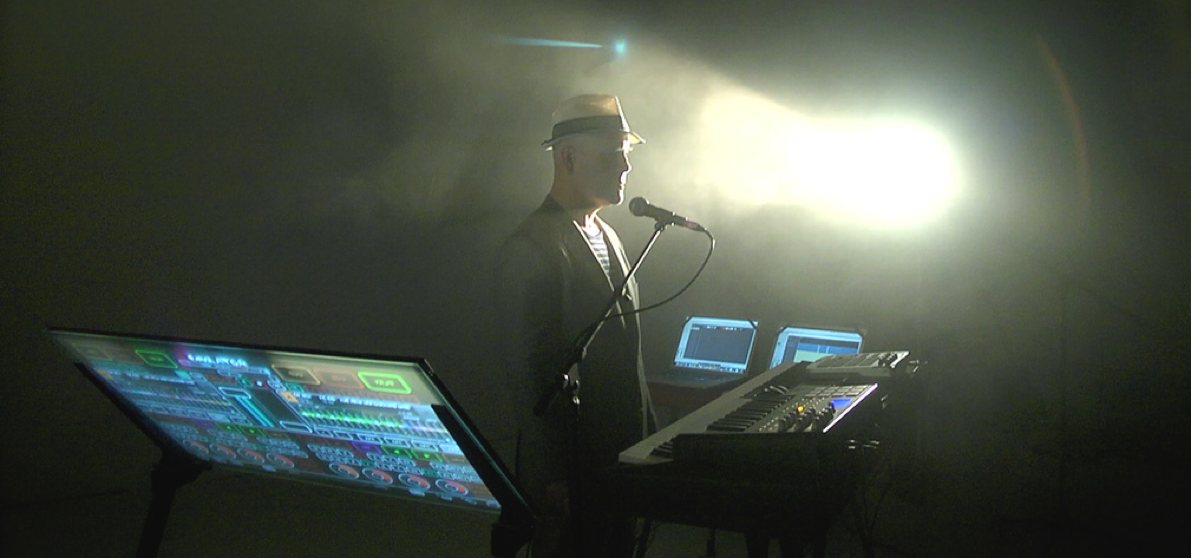
There’s a romance to that.
Definitely. And this underground would make do with any technology they could lay their hands on for communication, for resistance. That’s the way I relate to technology.
To me, the film seems to attempt to reconcile a bit more than childhood memories. Is The Invisible Lighthouse some sort of grand midlife crisis-project?
(chuckling) I’m not having a midlife crisis… I guess I’m having a sort of middle-aged “heads up,” really. I moved back to the U.K. partly to reconnect with my roots, partly to… yeah, to reconcile myself with my home country, which at the time I left… was very hostile towards me and my music. Things have calmed down a lot, and I’m much better received now. And partly also to give my own children the experience that I had growing up in the English countryside. So all of those things came together – not just during the filmmaking, but over the last five years – while I’ve been doing the whole Floating City chapter of my work.
Has making the film enabled you to make any better sense of these things? Is your head clearer now?
(laughing) No, I’ve made no sense of it at all, it’s as clear as mud. What I have done, really, is to immerse myself in some of the elements that made me tick, originally. I was always an unusual songwriter, and I really felt, going back, that I owed some of my “muse” to the unusual atmosphere and vibe of this coast – and to the legacy of my family history there. And so this has really been a re-exploration of that.
I think as a parent, you tend to see it through the eyes of your children. They’ve grown up with my music, but this has given them a chance to really understand where it came from. It may be lost on them as young people, but I think when they get a bit older, they’ll remember this time – and understand that this was me passing on this legacy on to them.
Did you wind up doing any family-history research for the film, or were these things learned as you grew up?
It was certainly part of my growing up… but there was a certain stigma attached to it in the U.K., because the U.K. is very class-conscious. In the last fifty years or so, there’s been a backlash against any sense of inheritance… but we’re morbidly fascinated with it, at the same time. That’s why something like Downton Abbey is so popular now – you can see the unraveling of that class system.
It’s a little bit strange, but it turns out that my ancestors were actually pretty cool. A lot of my great-aunts were suffragettes; one of my great-aunts was the first licensed lady physician in Britain. My grandmother used to travel to America, lecturing about women’s health care and contraception… in the 1920s! She met Charlie Chaplin in Hollywood, on the set of City Lights.
Whoa!
So I found out all these great things about my ancestors, and they were all pretty cool. They weren’t this sort of “idle rich” at all. So that was a very nice thing to find out.
But these folks were “landed,” or loaded, so to speak?
Actually, my great-great-grandfather wasn’t going to inherit the family business, so he ran away to the East End of London – where he became a pawnbroker. That’s where he made his fortune; he then went back to the country and started another business of his own.
I got a kick out of the bit in the film about your grandmother or great-grandmother keeping half of her food supplies poisoned, in case the Germans came knocking.
(Chuckling) Yeah, she had a house on the coast; she ran it as a home for kids evacuated in the London blitz. She used to poison half the food in her larder. This is before my time, but if you were a visitor there, the first thing you had to do was memorize which food was safe to eat – “Don’t eat that Stilton cheese, it’s been laced with strychnine.”












